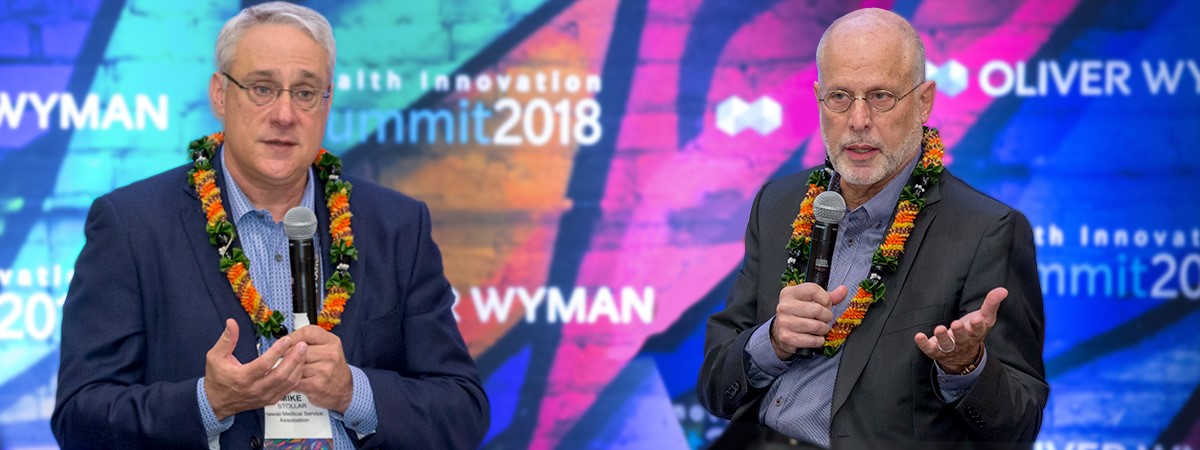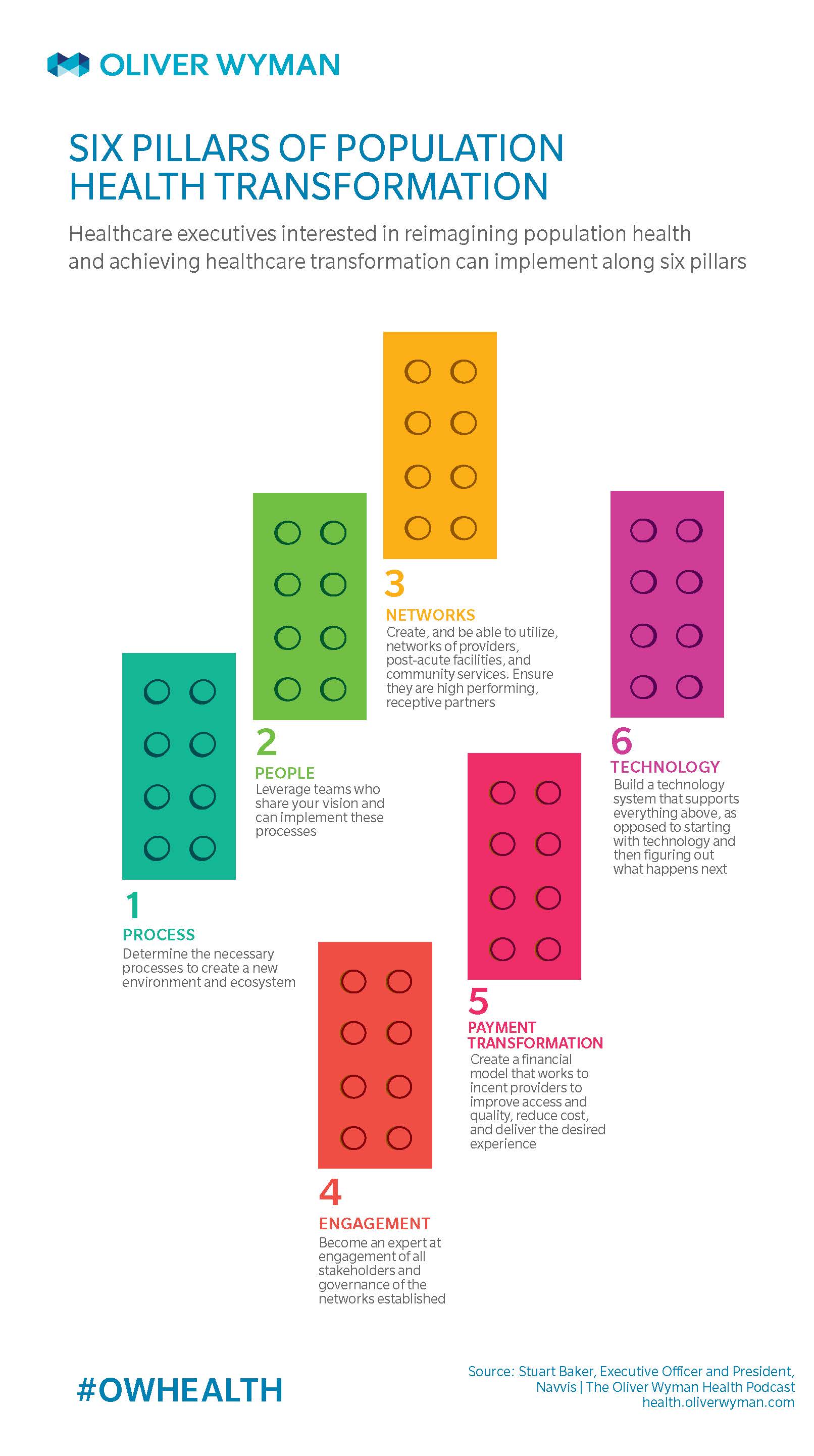Hawaii. A vacation destination known for its vibrant beaches, world-class surfing, and now a population health partnership to redefine healthcare innovation. In this episode of the Oliver Wyman Health Podcast, Jacqueline DiChiara, Oliver Wyman Health's Podcast Producer and Editor, caught up with Dr. Stuart Baker, Executive Officer and President of Navvis, and Mike Stollar, President and CEO of the Hawaii Medical Service Association (HMSA), at the last Oliver Wyman Health Innovation Summit in Dallas to discuss Navvis and HMSA's collaboration to improve the health of the people of Hawaii.
For this episode and more, check out the Oliver Wyman Health Podcast page, featuring executive conversations on the business of transforming healthcare. Or, just tell Alexa, "Play Oliver Wyman Health Podcast."
A Partnership to Help Transition to Value-Based Care
Several years ago, HMSA began something pretty unusual in healthcare. It stopped reimbursing primary care physicians for the number of patient visits. Instead, physicians received a lump sum based on past payments. In 2014, HMSA engaged population health company Navvis, to help with payment transformation with the goal of moving all primary care physicians from fee-for-service into a value-based payment program. By 2016, about 120 physicians of almost 1,000 total primary care physicians in their free choice system began participating in a nine-month long design pilot. As of October 2018, no primary care physicians in Hawaii receive fee-for-service payments.
"The reason to transition from fee-for-service to a value-based model is the same reason social determinants of health are being addressed: we need to move from episodic event health and healthcare to continuous healthcare. We’ve got to have a payment model that’s commensurate with that," said Stuart.
"We designed a system together that ended fee-for-service and moved our primary care physicians to a payment model that allowed them to earn additional compensation based on access, quality, and cost measures,” added Mike.
By focusing on better understanding what doctors want and need, and then providing the tools and services that help support their practices, HMSA replaced fee-for-service with a new system that rewards doctors for access, quality, and cost management. But just paying for volume alone, Mike said, wasn’t going to reshape the sustainability of Hawaii's healthcare system. Research with partners, upfront engagement with the greater physician community, conversations on how they envisioned their practices progressing in time, and work with a Physician Advisory Committee, were just a few first steps towards actionable progress.
The two companies have now deployed 200 different resources – including nurses, social workers, pharmacists, and behavioral health workers – to support both primary care physicians and their patients – and to help those people most in need navigate the healthcare system.
Today, physicians are reimbursed a base per member per month (PMPM), have quality incentive measures, and a total cost of care opportunity to make additional revenue. PMPMs range from $13 to $40.
"Every year for the next three years, we’ll up the degree to which quality and cost performance as well as access drive each physician’s PMPM, which was initially based on their historical fee-for-service performance. So, this year, a third of those factors contribute to the payment model. Next year, it will be two-thirds. And the following year, the entire payment model will be based on those factors," Mike added.
"'Māhie,' [pronounced Mah-hee-ay] a Hawaiian word, comes from an ancient Hawaiian allegory about a fern that transforms itself into a young woman, who becomes a caregiver. It's that transformation we embody."
Best Practices That Guided a Successful Transition
This partnership was both challenging, yet rewarding to execute, both explained. Mike said one of the greatest challenges was that partnering involved a different approach than the vendor relationships they were used to. Both executives attributed a mixture of old-fashioned elbow grease, perseverance, optimal timing, and a collaborative spirit to help leverage skill sets from two different organizations.
“The fact that we engaged physicians early on and listened to their desires and aspirations made a huge difference in how the entire community took to this program. It wasn’t easy, but without that level of engagement, without building trust with our physician community over time, this program wouldn't have gotten off the ground,” said Mike.
"It came down to serendipity that HMSA had the right leadership and right vision at the right time. Absent that, I don’t think it would have happened," Stuart said.
A Joint Vision Focused on Asking the Right Questions to Get the Right Answers
HMSA and Navvis now embrace two shared philosophies regarding their greater vision and mission:
1. Never stop caring.
2. Focus on "What matters TO you?" instead of "What’s the matter WITH you?"
First, the philosophy of "Never stop caring". "Patients are not discharged from their condition or life situation. They’re just discharged from a particular care giving place. How do we make sure we never stop caring?" Stuart asked.
"Second, we always ask, 'What’s the matter with you?' And then we tell people what the matter is and what we’ll do next. What we’re trying to switch to – and what HMSA is thinking about – is what matters to people – members and patients. This mindset will help develop a much stronger health and healthcare system – and much more engaged people. And this extends to the provider world too – understanding what matters to providers. If we can connect all that together, we’ll have a meaningful and sustainable system.”
Defining Transformation
What does it mean to create cultural transformation moving forward? Stuart said the key to transformation is engaging physicians through active participation and aligned financial incentives, empowering them with actionable, real-time information, and enabling them to address social and real life determinants of health through an accessible, connected ecosystem that includes such things as care coordination, care management, navigation, behavioral health, and community services.
"Payment transformation is one important step along the journey towards a comprehensive member experience transformation. What everyone’s trying to do in this experiential economy is provide a unique, satisfying experience in healthcare, tuned to the wants and needs of the individual," he said.
It’s Not About Location, Location, Location
"There are certain disadvantages to being a group of tiny islands out in the middle of the Pacific. But, there are also certain advantages that revolve around our culture, our isolation, and the need to do things together," Mike explained. "All of our kids, whether you’re on the payer side, the provider side, or the employer side – we all went to the same schools. We run into each other at the grocery market. And so, it’s no place to harbor anger and frustration. It’s a place where people have to work things out, and this is just culturally part of who we are. We applied that to the healthcare delivery system and to the community as a whole."
“These lessons can be taken to the mainland, too,” added Stuart. “There’s an old African proverb that says, 'If you want to go fast, go alone. If you want to go far, go together.’ Partnerships need to form to solve these problems. I think it’s the only way. And that’s what we’re excited about."
Regarding what comes next, just look to the land of Hawaii for inspiration. "'Māhie,' [pronounced Mah-hee-ay] a Hawaiian word, comes from an ancient Hawaiian allegory about a fern that transforms itself into a young woman, who becomes a caregiver," said Mike. “It's that transformation we embody. We realized if we were going to engage the rest of our stakeholders, we had to start with ourselves.”
Moving Forward: Six Pillars of Population Health Transformation
Stuart advised those executives interested in reimagining population health to consider these focuses:
For this episode and more, check out the Oliver Wyman Health Podcast page, featuring executive conversations on the business of transforming healthcare. Or, just tell Alexa, "Play Oliver Wyman Health Podcast."




